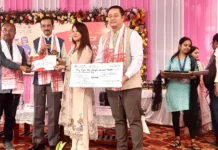Monday Musing
[ Amar Sangno ]
Vacillating between different topics that I could write about, I ruminated long on the pressing issues that have long been confronting our state, and finally I settled down on education.
The health and education sectors have always been on successive governments’ top agenda. However, neither sector gets any attention from our own citizens. Thanks to the ravaging Covid-19 pandemic for resetting the health sector conversation in Arunachal, paving the way for a paradigm shift in the sector in terms of infrastructures.
On the other hand, the education sector has become a theatre with no audience. There is a drought of citizens’ participation to reinvigorate the human capital in our state. The student unions, civil society groups and community-based organizations hardly participate in conversations to transform the education sector.
Our state once again finds herself at rock bottom in the Performance Grading Index (PGI) of the department of school education and literacy under the ministry of education. According to the 2019-20 PGI, it secured Grade IV – one of the worst performing states in India. The performance matrix was based on five categories: learning outcomes and quality, accessibility, infrastructures and facilities, equity and governance, and management.
Arunachal finds herself as the worst performing state on every count. For instance, in learning outcomes and quality, out of 180, Arunachal is at the bottom among all the states in India. Rajasthan is on top position with 168, and Assam with 150 is at the top among the Northeast states.
The PGI exercise envisages that the index would propel states and union territories to undertake multipronged interventions that will bring about the much-desired optimal education outcomes.
Sadly, the worrying trend that potentially indicates that our future generations are at stake finds no place in our state’s debates and discussions. For the netizens, trivial topics have more taste. They have no appetite for creating a buzz on the degrading human capital of our state. The student organizations, whose sole purpose of formation is to focus on the education sector and the students’ welfare, have long shifted their gears from real issues to money-oriented and corruption-based issues. On the other hand, stakeholders like the teaching community associations merely concentrate on issues that benefit them, instead of giving back by concentrating on what they have been assigned.
Seemingly, no one seems to be keen to ponder on our bleak future. The civil society groups turn a blind eye and are keener on petty issues. The community-based organizations are content with their community’s candidates’ success, busy in exchanging congratulatory messages with felicitous phrases, and have no time to think about pan-Arunachal issues.
This year, the Chief Minister Pema Khandu-led government announced Rs 1,000 crores for revamping and overhauling the education sector in the 2021-22 annual budget. It dedicated the year 2021 as the ‘Year of Education’ to transform the education sector.
The Khandu-led government also launched ‘Mission Shiksha’ recently – a strategy to improve the standard of education in the next two years with six focus areas: infrastructure development, technology intervention through information and communication technology and digital initiatives, teachers’ training, early childhood care and education centres, evaluation of teachers and students, and rationalization of teachers’ posting.
South African Nobel Laureate Desmond Tutu once said, “Inclusive, good quality education is a foundation for dynamic and equitable societies.”
Let’s hope that the education department’s ‘Mission Shiksha’, a grand strategy to overhaul the education sector, resonates among the stakeholders, particularly the students’ organizations and the teachers’ associations, to take literacy in Arunachal to new heights.

